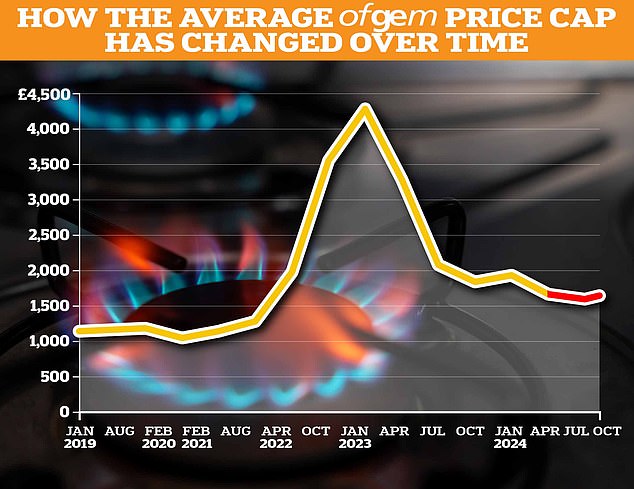Table of Contents
Energy prices will fall by 7 percent for millions of households from July 1, but are expected to rise again from October. So is now a good time to set your rate?
The average household paying by direct debit will see their annual gas and electricity bills fall from £1,690 to £1,568 from 1 July, a drop of £122, although exactly how much their bills will rise depends on how much energy they use.
This is because Ofgem has reduced the rate of its price cap, which sets the fixed charges and unit rates paid by households on variable rate energy tariffs.
Most households have been on these deals since prices soared in 2022, but fixed tariffs are now starting to return, allowing them to freeze their energy costs for a year or two.
Spike: Ofgem’s price cap peaked in early 2023 and is now falling to a lower level, but could still rise by a small amount later this year.
Analysts at Cornwall Insight believe the typical energy bill will rise to £1,636.44 in October and rise slightly again to £1,634.20 in January 2025.
But if the cap price drops substantially after that, there’s a risk that those who choose a fixed-rate plan today could end up overpaying.
So what fixed rate deals are out there and are they worth considering?
Should you accept a fixed energy rate?
No one can say with 100 percent certainty whether energy prices will rise, fall or stay the same.
Therefore, signing a fixed rate agreement means taking a risk on the future direction of these bills.
However, Cornwall Insight has a good track record of accurately predicting the direction of energy bills and has been very reliable.
On that basis, locking in a cheaper rate starting July 1 seems like a good way to achieve some small energy savings during 2024.
However, the problem is that there are very few cheap fixed energy offers.
A spokesman for Cornwall Insight said there were only 31 fixed-rate deals on the open market as of June 27.
However, there are numerous secret fixed-rate energy deals that only energy companies offer to their existing customers.
These can be cheaper than the maximum price, although in practice most are just below it.
The only way to know if a fixed rate deal is right for you is to calculate how much you pay for energy now and compare it to any fixed deal you are offered.
Ben Gallizzi, energy expert at Uswitch, said: ‘The long-term outlook remains very uncertain and prices are expected to remain at a similar level in the first quarter of next year.
‘Households should therefore avoid lulling into a false sense of security as energy bills fall this summer, as the respite will be relatively short-lived.
‘It is important to prepare now for future price increases and consider locking in rates while there are competitive offers to choose from.’
How do I know if a solution will save me money on energy?
To determine whether an energy contract, whether fixed or not, is cheaper than what you pay now, compare the unit rate and fixed charge with what you currently pay.
The average household pays tariffs capped by Ofgem’s price cap. From 1 July, that means paying 60.12p per day in fixed charges for electricity and 31.41p per day for gas, while unit rates for electricity will be 22.36p per kilowatt-hour (kWh) and 5.48p per kWh for gas.
The most important variable is what will happen to Ofgem’s price cap in the future. You may be able to get a cheaper deal now, but the price cap drops significantly and you end up paying more.
Beware of exit fees on your energy bill
Another disadvantage of fixed-rate energy agreements is that they often carry high exit fees, unlike variable-rate agreements.
Exit fees are paid when you leave a fixed-rate energy contract before the end of the term, usually 12 months.
Researchers found that exit fees increased by 345 per cent from an average of £42.06 in early 2021 to a high of £187.21 in April 2024.
This can present a problem for anyone signing up for a fixed rate now.
Most solutions last between 12 and 24 months and it is impossible to predict how they will affect energy prices during that time.
It might be possible to find a solution now and save money, only to fail if energy prices rise in 2025.
If that happens, anyone with a solution would have to decide whether it’s cheaper to stay where they are or pay exit fees and move to a lower-priced deal.
SAVE MONEY, EARN MONEY

Savings offers

Savings offers
Premium fares plus £50 bonus until 15 July

Cash Isa at 5.17%

Cash Isa at 5.17%
Includes 0.88% bonus for one year

Free Stock Offer

free share offer
No account fee and free stock trading
5.78% savings
5.78% savings
has 365 days notice

Fiber broadband

Fiber broadband
£50 BT Reward Card: £30.99 for 24 months
Affiliate links: If you purchase a This is Money product, we may earn a commission. These offers are chosen by our editorial team as we believe they are worth highlighting. This does not affect our editorial independence.
Some links in this article may be affiliate links. If you click on them, we may earn a small commission. That helps us fund This Is Money and keep it free to use. We do not write articles to promote products. We do not allow any commercial relationship to affect our editorial independence.


